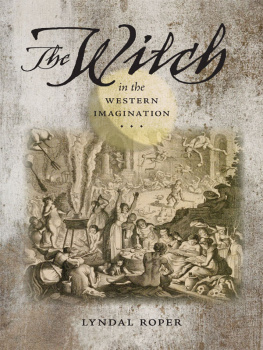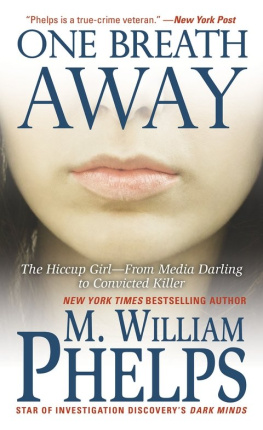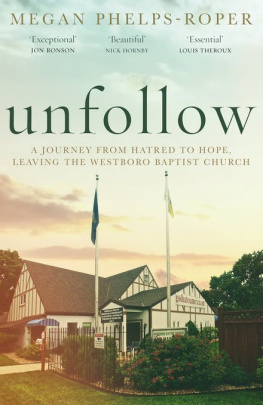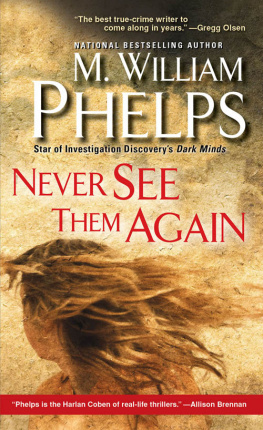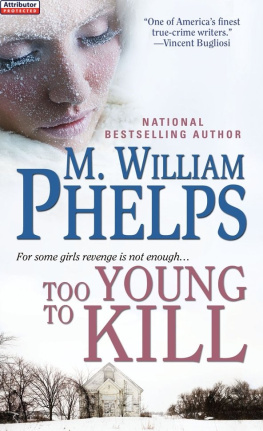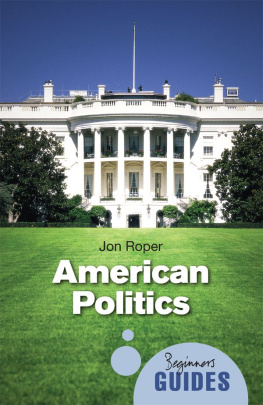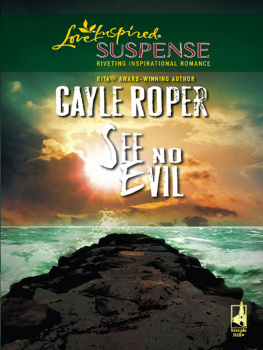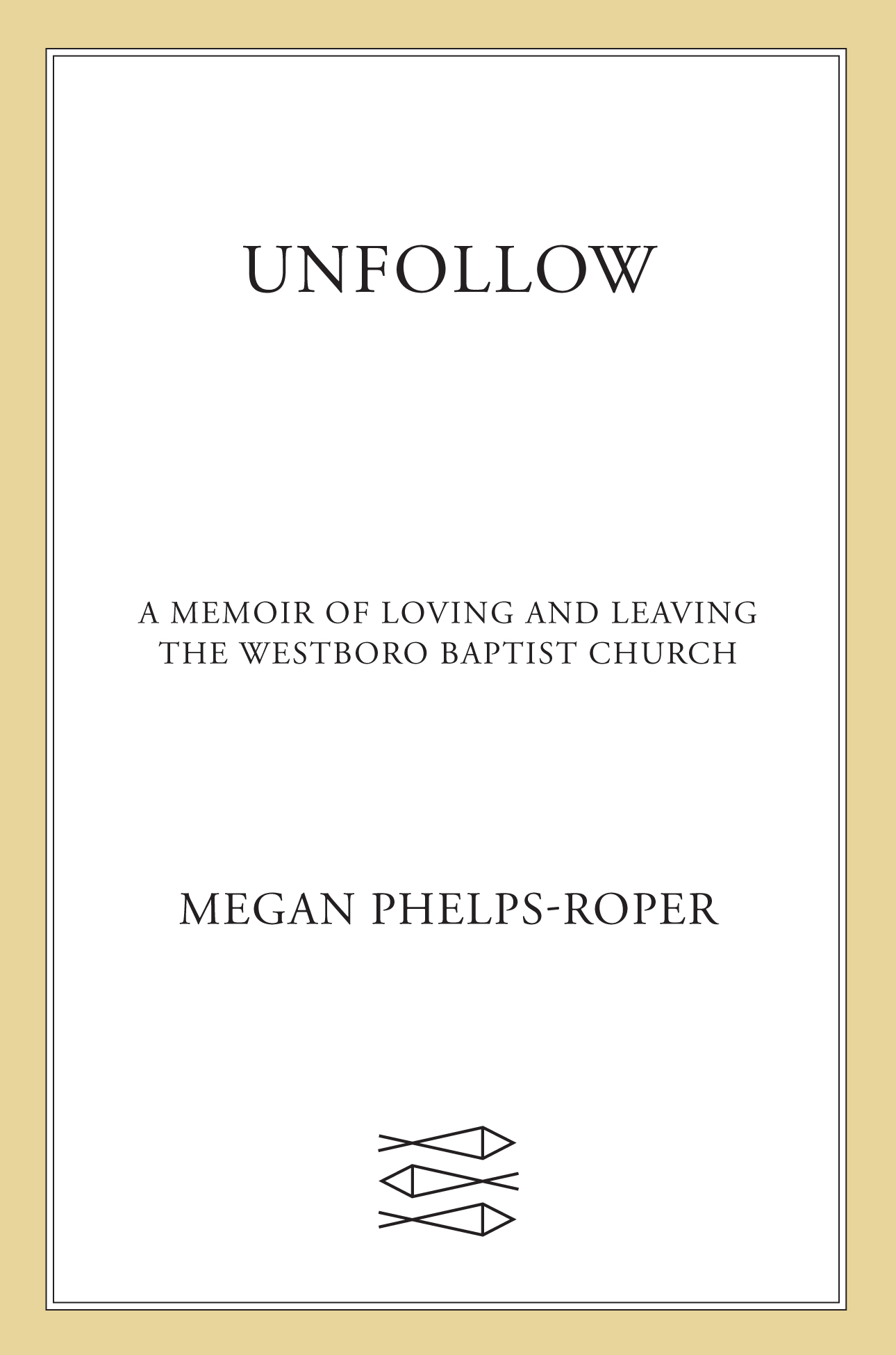The author and publisher have provided this e-book to you for your personal use only. You may not make this e-book publicly available in any way. Copyright infringement is against the law. If you believe the copy of this e-book you are reading infringes on the authors copyright, please notify the publisher at: us.macmillanusa.com/piracy.
Reserving judgments is a matter of infinite hope.
F. Scott Fitzgerald, The Great Gatsby
If a mother thinks something is important enough to take a public position about, shouldnt she teach her children that value? Where else should children be at the time of public debate? At the local video arcade? I dont think we should pretend that these vital issues dont affect children.
Shirley Phelps-Roper, letter to the editor, Topeka Capital Journal, August 26, 1991
I didnt understand what was going on, not at first. The signs simply appeared one day and never left, like some undeniable force of nature. Id guess Topekans experienced their arrival that way, as well. My mothers family had been a well-known and polarizing presence in the city for decadesbut in my memory, the picketing is the beginning, and it started at Gage Park.
It sure didnt look like a park to me. There were no swings or slides or jungle gymsjust an open field that separated the place where we parked from the busy intersection of 10th Street and Gage Boulevard. As pastor of the tiny Westboro Baptist Church, my grandfather would drive the big red pickup filled with signs hed made, and the rest of the churchconsisting almost entirely of my aunts, uncles, cousins, parents, grandparents, and siblingswould follow in a caravan of vehicles. I couldnt read the messages Gramps had carefully written since I was still a few months shy of kindergarten, but when I saw photos as a teenager, I was surprised by how small and restrained some were compared to what came later: WATCH YOUR KIDS! GAYS IN RESTRMS.
The adults would pick up as many signs as they could carry, walk them across the field, and lean them against the trunks of the two biggest trees. The rest of us just had to walk by and grab one. During those first few monthsJune, July, August of 1991our habit was to hold our signs and walk in a big circle just next to the roadway, cars whizzing by in all four lanes of traffic. The baseball hats my dad made us wear always gave me headaches, but I was glad to have them once I was out there walking in the heavy afternoon heat.
As I got older, I came to learn the story of Gage Park and the events that prompted our first protests. In the summer of 1989, two years before we started picketing, Gramps had been biking through the park with my brother Josh, who wasnt quite five years old at the time. My grandfathers custom was to ride ahead a bit, and then circle backride ahead, and circle back. One of the times he did so, he thought he saw two men approaching my brother, apparently attempting to lure him into the wooded area shrouded by bushes at the southwest corner of the park. Alarmed and livid, Gramps got to work. He spoke with one park official who told him, At any hour of the day or night, male couples may be seen entering and exiting the area. The official also mentioned that he regularly passed along citizen complaints to his superiorsbut to no avail. My grandfather soon discovered that sex in the park was a well-documented issue in the local media; sting operations conducted by the Topeka Police Department had resulted in a string of high-profile arrests over the years. A nationally circulated gay and lesbian travel guide listed the park as a cruisy areaa place where men could cruise for anonymous sex. Even now, Gage Park is listed in that guide, though a warning was added shortly after Westboros picketing began: AYOR. At your own risk.
Armed with this information, my grandfather took action. He began by detailing his findings in a letter to the mayor, opening with a colorful description of the problem (A malodorous sore with the scab off is open and running at the extreme southwest corner of Gage Park) and concluding with a question: Do you think Gage Parks running sore could be permanently fixed? Your consideration is appreciated. The mayors response acknowledged that the city of Topeka was well aware of the situation at the park, and that they were in the process of putting together a program to bring the situation to a halt. Nearly two years passed, during which time my grandfather monitored the situation, with no apparent improvement. He continued to write letters to city officials and to appear regularly at city council meetings, insisting that they clean up the park. According to church lore, my grandfather accused city officials of sitting around like last years Christmas trees during one such meetingat which point the mayor instructed the police to escort my grandfather out of the council chambers.
Convinced that the city would persist in its idleness, Gramps decided that we would take to the streets and demand that it take action.
In hindsight, our protests were bound to elicit an intensely negative reactionespecially because our message went far beyond calls for the cleanup of Gage Park. Gramps was an Old School Baptist, he said, and was determined to represent the Scriptural position on homosexuality. He leapt immediately into attacks on the gay community as a whole, blaming them for the AIDS epidemic and proclaiming that they deserved the death penalty. The Topeka Capital Journal published many Westboro letters, including one signed by one of my aunts comparing the United States to Sodom and Gomorrah, cities destroyed by God [b]ecause of their sin regarding homosexuality. She declared AIDS to be a disease for which the homosexual must take the sole blame and insisted that the blood of straight AIDS victims should be avenged upon those guilty of introducing and gleefully spreading this deadly disease: the homosexual. Even during an era in which disapproval of LGBT people was more common and socially acceptable, it took only four short sentences for my aunt to make claims scandalous enough to outrage most readersand our signs managed to do the same with even greater economy. MILITANT GAYS SPREAD AIDS. EXPOSE GAY-AIDS PLOY. GAYS ARE WORTHY OF DEATH (ROM. 1:32) = AIDS. And soon enough, what would become our most infamous message: GOD HATES FAGS.
The community response to our protests would mystify me for years, thanks to an ignorance borne both of youth and of the religious education I was receiving at home. I was five years old when the picketing began, and I didnt understand why anyone would reject our message, let alone why our protests would draw counterprotesterscounters. They came every week in the beginning, and I was scared of them at first. Young punks and diseased, probably got AIDS, Gramps would say. The Bible forbade girls to cut our hair, but some of their women came out with cropped manes colored bright reds and blues and purplesKool-Aid hairand with metal in their faces. There were boys with mullets, others with half their heads shaved and the other half covered by long black hair that hung in greasy strands across ugly faces. Some looked like my dad, tall and skinny in tank tops and the awfully short running shorts in style at the time, and some were fat and bearded, combat boots on their feet and flannel shirts tied around their waists. Theyd come out in angry mobsfifty, a hundred, more and lessand try to surround our group of about thirty, starting fistfights with the Westboro dads who made a human barrier between us and them. Sometimes there were cops and sometimes there were handcuffs and sometimes we were in themwhich wasnt fair, I thought, because we were just trying to protect ourselves from those ruffians. I held my breath whenever I walked by them, so I wouldnt catch whatever it was that was making them such awful people.


